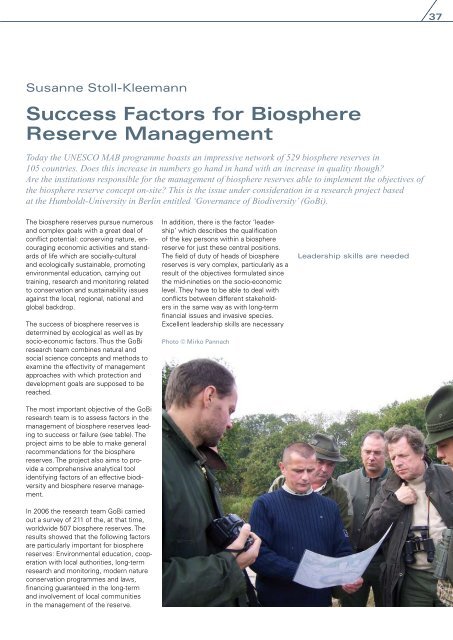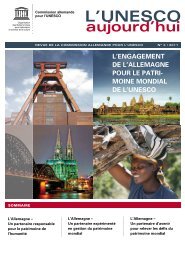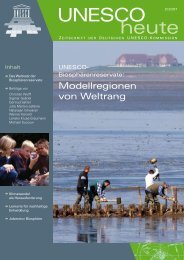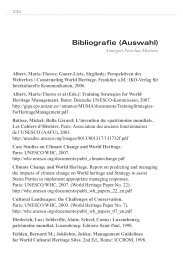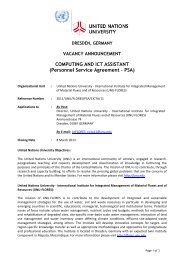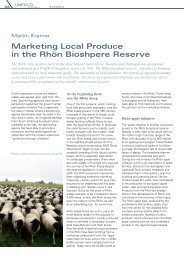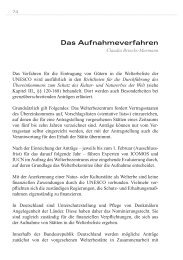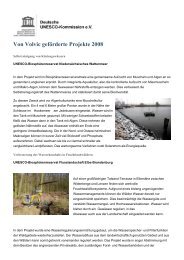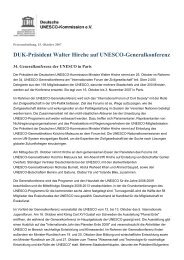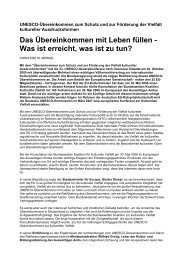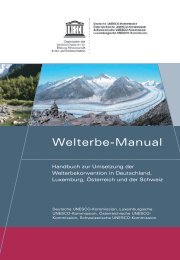Biosphere Reserves - UNESCO Deutschland
Biosphere Reserves - UNESCO Deutschland
Biosphere Reserves - UNESCO Deutschland
You also want an ePaper? Increase the reach of your titles
YUMPU automatically turns print PDFs into web optimized ePapers that Google loves.
Susanne Stoll-Kleemann<br />
Success Factors for <strong>Biosphere</strong><br />
Reserve Management<br />
Today the <strong>UNESCO</strong> MAB programme boasts an impressive network of 529 biosphere reserves in<br />
105 countries. Does this increase in numbers go hand in hand with an increase in quality though?<br />
Are the institutions responsible for the management of biosphere reserves able to implement the objectives of<br />
the biosphere reserve concept on-site? This is the issue under consideration in a research project based<br />
at the Humboldt-University in Berlin entitled ‘Governance of Biodiversity’ (GoBi).<br />
The biosphere reserves pursue numerous<br />
and complex goals with a great deal of<br />
conflict potential: conserving nature, encouraging<br />
economic activities and standards<br />
of life which are socially-cultural<br />
and ecologically sustainable, promoting<br />
environmental education, carrying out<br />
training, research and monitoring related<br />
to conservation and sustainability issues<br />
against the local, regional, national and<br />
global backdrop.<br />
The success of biosphere reserves is<br />
determined by ecological as well as by<br />
socio-economic factors. Thus the GoBi<br />
research team combines natural and<br />
social science concepts and methods to<br />
examine the effectivity of management<br />
approaches with which protection and<br />
development goals are supposed to be<br />
reached.<br />
The most important objective of the GoBi<br />
research team is to assess factors in the<br />
management of biosphere reserves leading<br />
to success or failure (see table). The<br />
project aims to be able to make general<br />
recommendations for the biosphere<br />
reserves. The project also aims to pro-<br />
vide a comprehensive analytical tool<br />
identifying factors of an effective biodi-<br />
versity and biosphere reserve manage-<br />
ment.<br />
In 2006 the research team GoBi carried<br />
out a survey of 211 of the, at that time,<br />
worldwide 507 biosphere reserves. The<br />
results showed that the following factors<br />
are particularly important for biosphere<br />
reserves: Environmental education, cooperation<br />
with local authorities, long-term<br />
research and monitoring, modern nature<br />
conservation programmes and laws,<br />
financing guaranteed in the long-term<br />
and involvement of local communities<br />
in the management of the reserve.<br />
In addition, there is the factor ‘leadership’<br />
which describes the qualification<br />
of the key persons within a biosphere<br />
reserve for just these central positions.<br />
The field of duty of heads of biosphere<br />
reserves is very complex, particularly as a<br />
result of the objectives formulated since<br />
the mid-nineties on the socio-economic<br />
level. They have to be able to deal with<br />
conflicts between different stakeholders<br />
in the same way as with long-term<br />
financial issues and invasive species.<br />
Excellent leadership skills are necessary<br />
Photo © Mirko Pannach<br />
Leadership skills are needed


